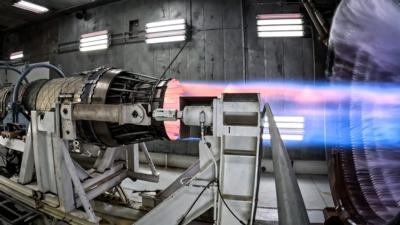Tue, May 21, 2024
Eagle Engine Proves to Be a Capable Partner for Hypersonic Ambitions
Hypersonic startup Hermeus provided an update on their engine testing, describing some of the progress made on their F100 engine installation.

The big deal lately has been integrating the Pratt & Whitney F100 into their 'Quarterhorse Mk 2', and understandably daunting issue given the excessive heat generated by pretty much every aspect of supersonic flight. Lately they've focused on cooling, developing a pre cooler to increase the max output of the F100 by chilling its pre-intake air. They apparently have seen some success, with their new system proving useful under a variety of loads. Still, much remains to be done, since they need to move onto hotter intake air and rougher thermal conditions.
The F100 will be the beating - or better said, whirring - heart of the Quarterhorse, drawing upon decades of design know-how gleaned from the engine's long life in the F-15 Eagle program. In Hermeus' installation, the engine will be part of the Chimera, a turbine-based combined cycle engine. IN lower speed regimes, the Chimera will operate in turbine mode with the F100, transitioning to a ramjet mode as it increases speed. Hermeus intends for the pre cooler setup to help mitigate a rough transition between the two modes of operations by increasing the F100's performance right up to ramjet speeds.

It's a problem seen in automotive and motorcycle design for years now, a frequent headache for tuners as they find their project 'stumbles' as it moves between one lower-output power phase to a higher-output one. But, it seems like Hermeus believes they're close to success, ensuring the Chimera powers right through Mach 2.5, and all the way up to Mach 4 in its current thought.
"Airbreathing engines are critical to Hermeus' goal of operationalizing hypersonic aircraft," said Hermeus Co-Founder and Chief Technologist, Glenn Case. "By making a full-range, air-breathing hypersonic engine, Hermeus is setting the stage for aircraft that are capable of taking off from a regular runway and accelerating up to hypersonic speeds. No rockets or motherships required."
More News
He Attempted To Restart The Engine Three Times. On The Third Restart Attempt, He Noticed That Flames Were Coming Out From The Right Wing Near The Fuel Cap Analysis: The pilot repor>[...]
Make Sure You NEVER Miss A New Story From Aero-News Network Do you ever feel like you never see posts from a certain person or page on Facebook or Instagram? Here’s how you c>[...]
From 2009 (YouTube Edition): Leading Air Show Performers Give Their Best Advice for Newcomers On December 6th through December 9th, the Paris Las Vegas Hotel hosted over 1,500 air >[...]
Aero Linx: NASA ASRS ASRS captures confidential reports, analyzes the resulting aviation safety data, and disseminates vital information to the aviation community. The ASRS is an i>[...]
“For our inaugural Pylon Racing Seminar in Roswell, we were thrilled to certify 60 pilots across our six closed-course pylon race classes. Not only did this year’s PRS >[...]
 NTSB Final Report: Rutan Long-EZ
NTSB Final Report: Rutan Long-EZ ANN FAQ: Turn On Post Notifications
ANN FAQ: Turn On Post Notifications Classic Aero-TV: ICAS Perspectives - Advice for New Air Show Performers
Classic Aero-TV: ICAS Perspectives - Advice for New Air Show Performers ANN's Daily Aero-Linx (06.28.25)
ANN's Daily Aero-Linx (06.28.25) Aero-News: Quote of the Day (06.28.25)
Aero-News: Quote of the Day (06.28.25)



